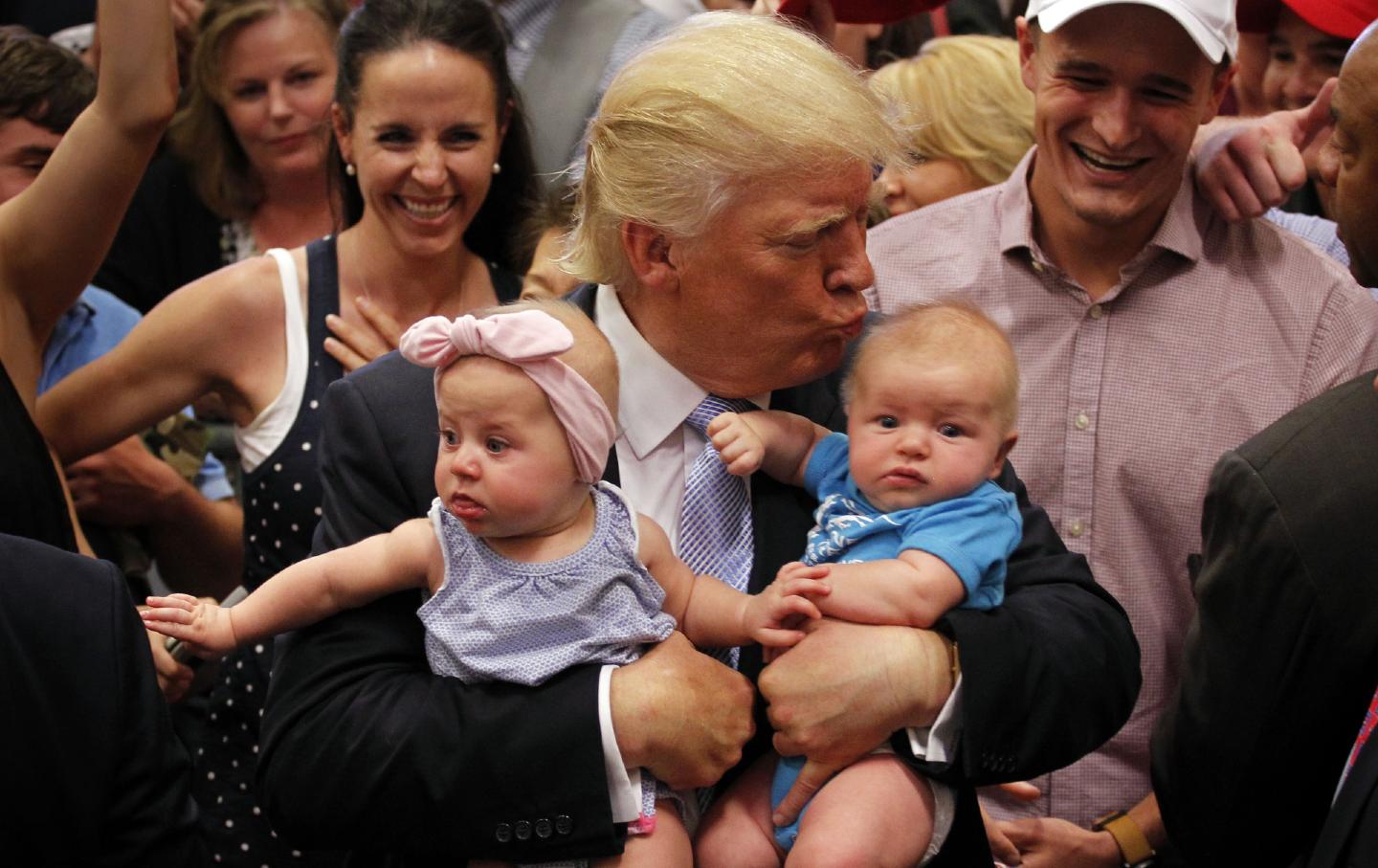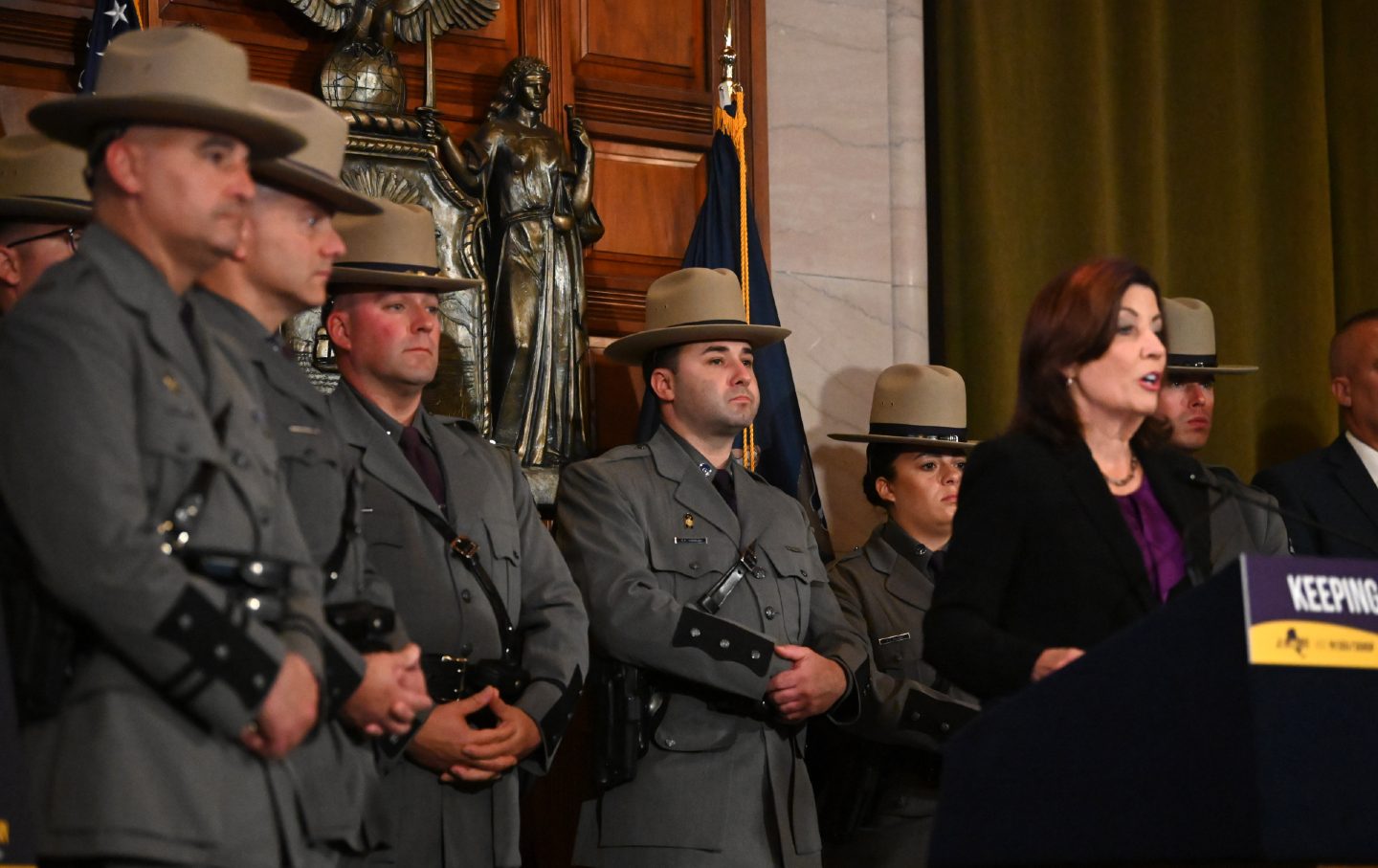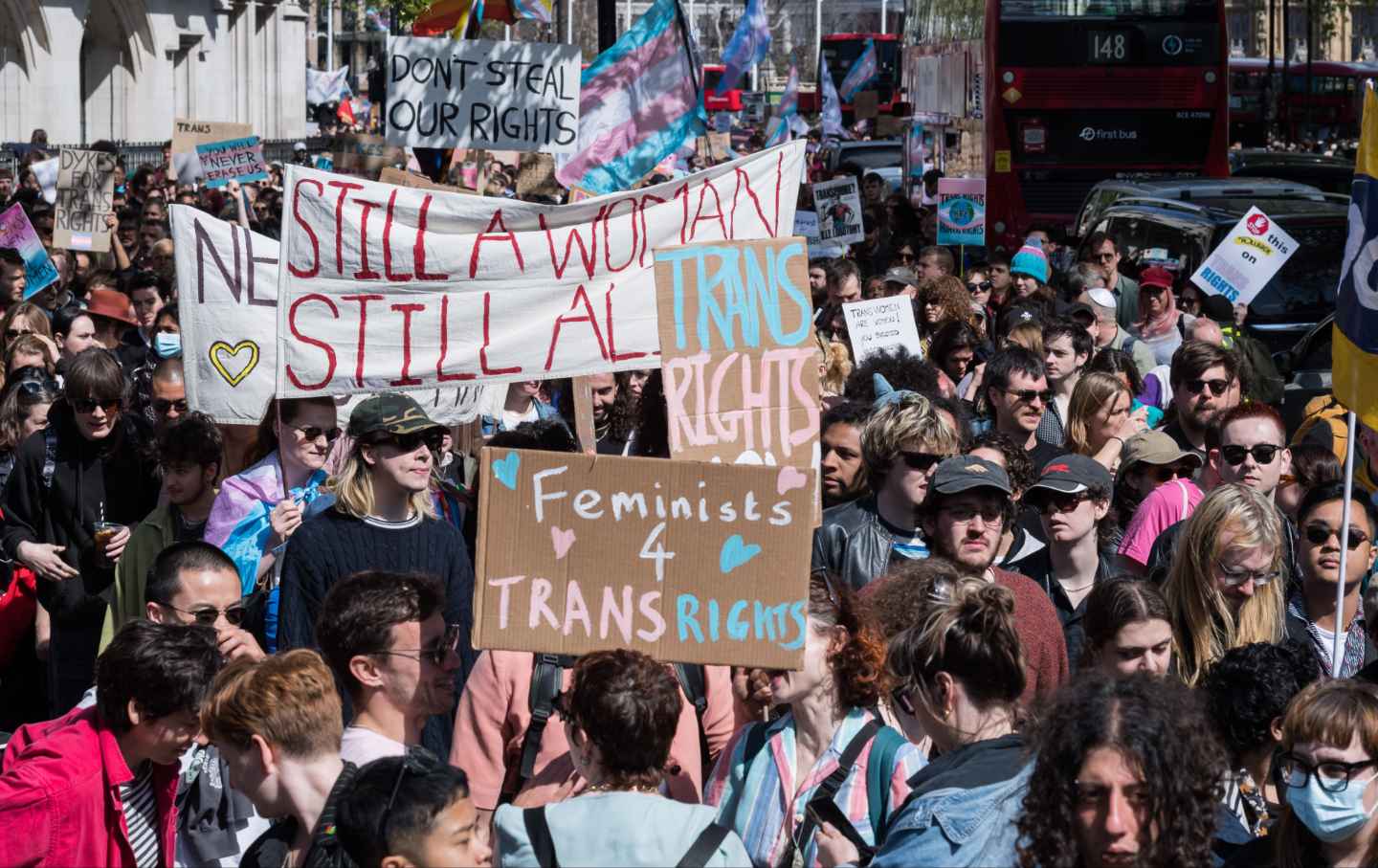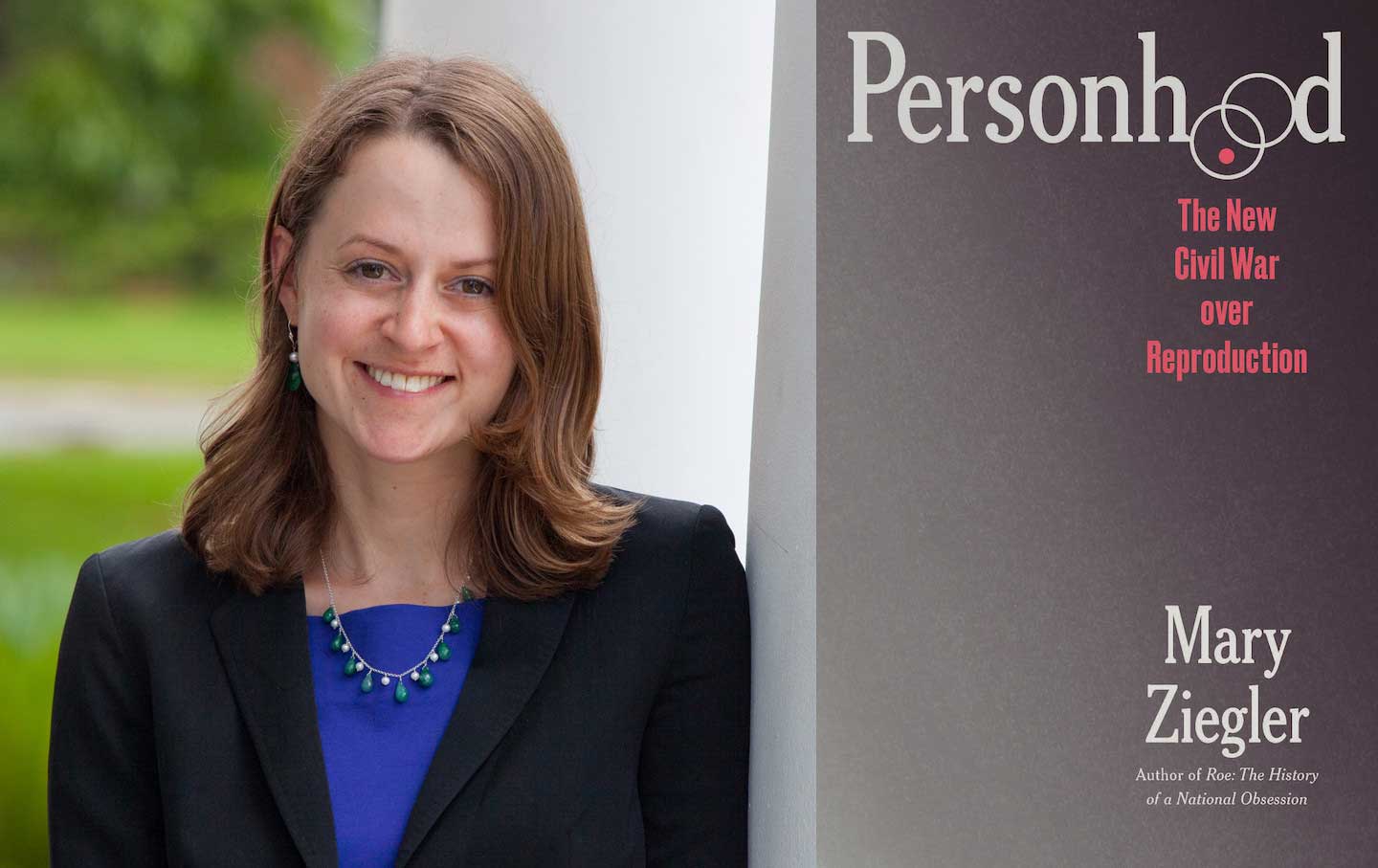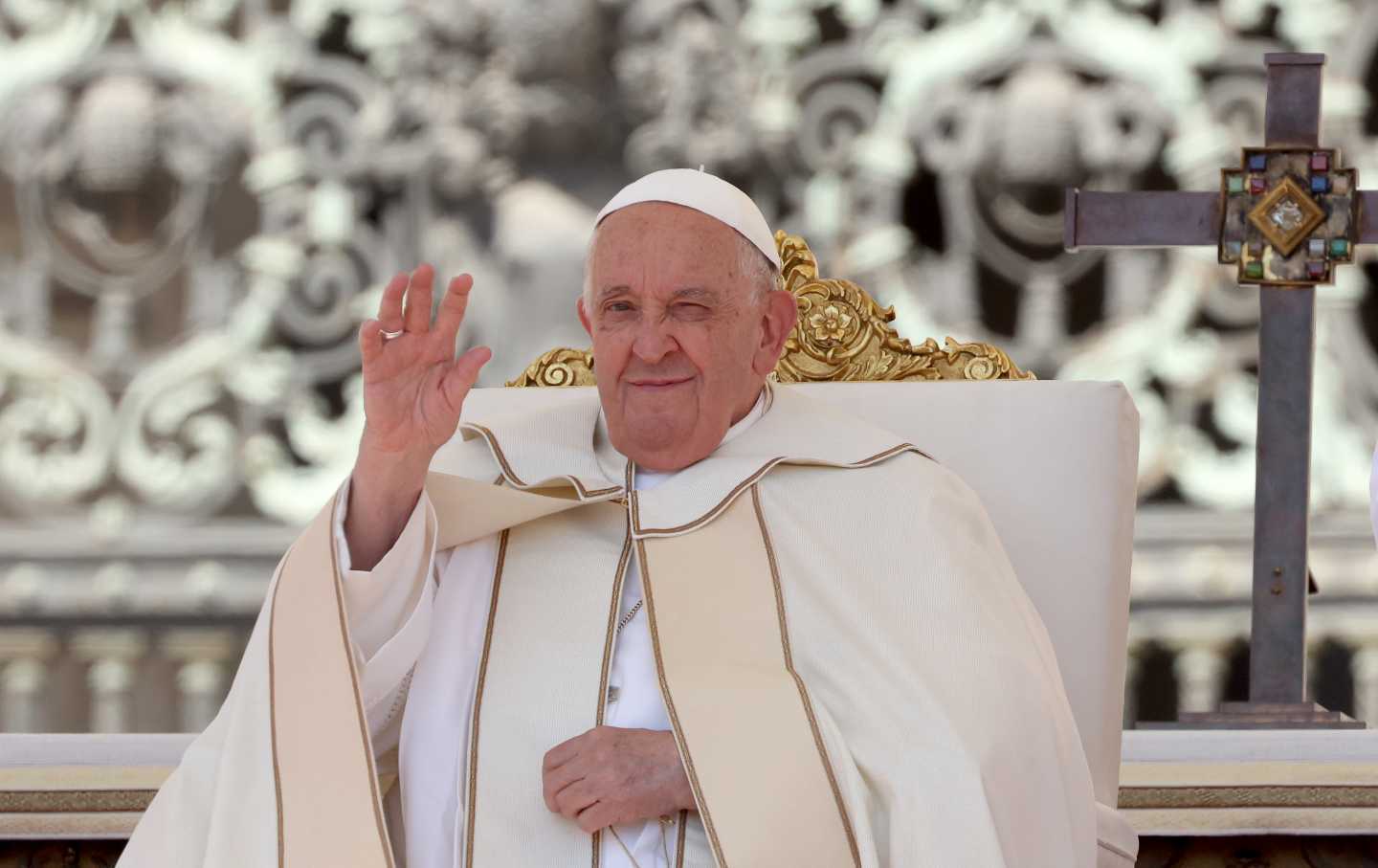We Are Asking the Wrong Questions About Mahmoud Khalil’s Arrest
The only relevant question is not “How can the government do this?” It is “How can we who oppose this fascist regime stop it?”
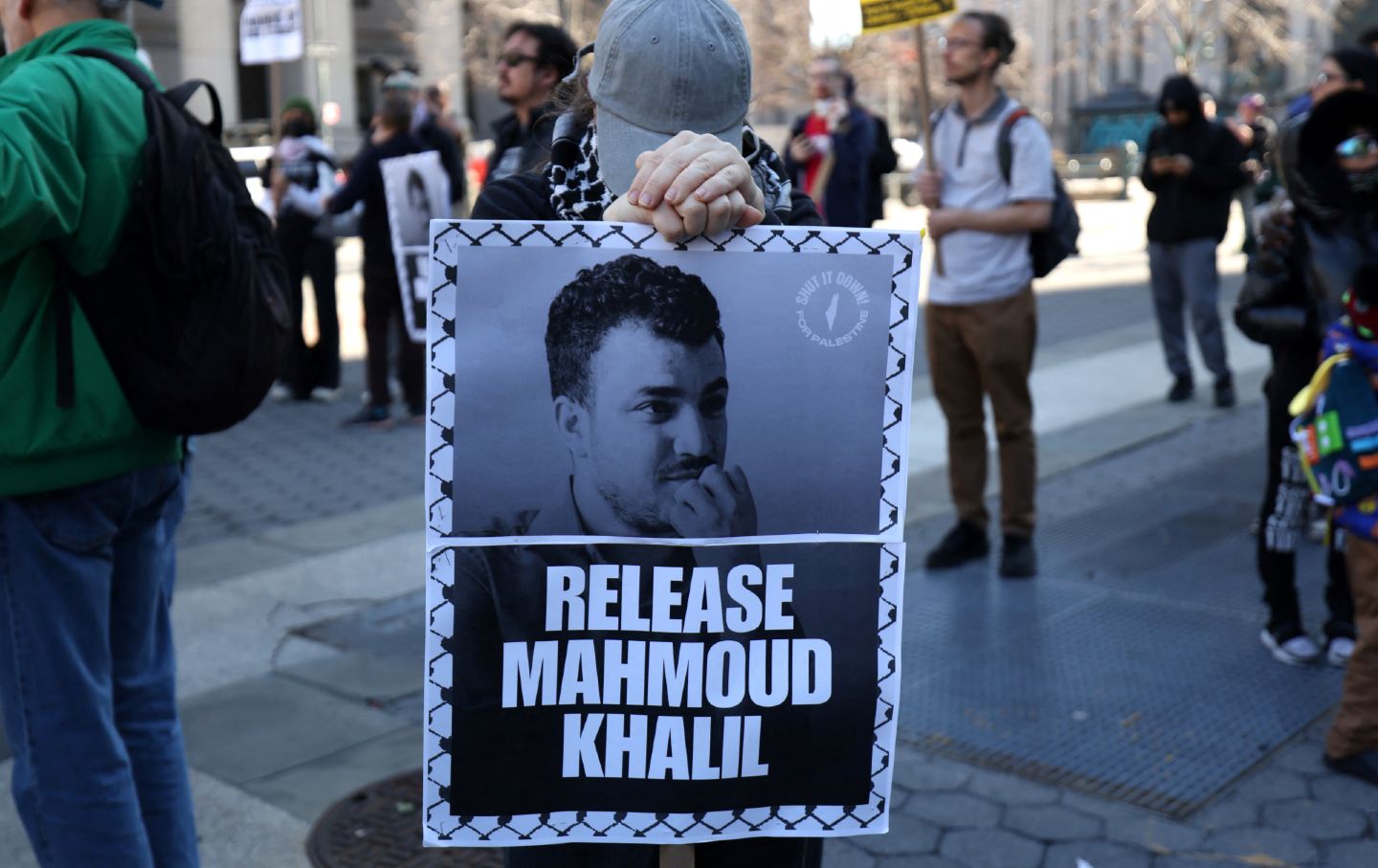
Protesters demonstrate in lower Manhattan in support of Mahmoud Khalil on March 10, 2025.
(Timothy A. Clary / AFP via Getty Images)
On Saturday night, student activist Mahmoud Khalil was abducted by the United States government. Federal agents, acting under the authority granted to them by the president of the United States, unlawfully entered Khalil’s apartment building as he was coming home. They informed Khalil that his green card had been revoked without a hearing, told him he was under arrest and would soon be deported, and threatened his eight-month-pregnant, US-citizen wife with unlawful arrest if she complained.
They then shipped Khalil to a for-profit detention camp in Jena, Louisiana. The facility, called the LaSalle Detention Center, is already well known for its human rights abuses, which include beatings, tear-gassing, and the pepper-spraying of children. It’s run by the publicly traded GEO Group, which closed at $22.92 a share on the New York Stock Exchange yesterday, in case anybody would like to ask their investment managers if their portfolios support fascism.
Khalil is there now, we believe, still in the country, thanks to a ruling by US District Judge Jesse Furman (an Obama appointee), who temporarily blocked Khalil’s deportation.
The most common question I’ve seen in the days since Khalil’s kidnapping is some version of “How can the government do this?” Journalists and lawyers have dutifully responded by explaining or guessing at the government’s “legal” authority to commit such a crime. Many of Trump’s actions are technically illegal, and explaining how he failed to dot the i or cross the t on his latest act of terrorism seems to make people feel better, for some reason.
I think people are asking the wrong question, and giving the wrong answer. The government can do this because the government has what scholars call a “monopoly of force,” meaning the government can violently attack people but the people are not legally allowed to violently fight back. This government can use its monopoly of force in this way because the American people elected a fascist dictator to rule over them. That dictator, Donald Trump, promised to do exactly what he is doing. The warrant for Khalil’s abduction was signed on November 5, 2024, by over 77 million people who voted for fascism, and 90 million eligible voters who couldn’t bring themselves to vote against fascism. The government can do this because this is what people who support Trump want the government to do.
Khalil has very strong arguments for why the government should not be able to do this. First of all, he is a green-card holder, which puts him in the category of legal permanent resident. This should afford him constitutional protections, like the due process of law. Khalil committed no crime, was arrested without a judge-issued warrant, was rendered to a far-off state, and was denied his right of habeas corpus—which requires the government to bring people before a court and inform them of their alleged crime.
According to a Trump post on Truth Social, the stated reason Khalil was abducted was that he was a “pro-Hamas” student who engaged in “pro-terrorist, anti-Semitic, anti-American activity.” None of that is remotely true. The government cannot prove that Khalil engaged in any terrorist activities, nor that he provided aid or comfort to terrorists. Even if you are one of those people who thinks that protesting for the rights of Palestinians to exist is tantamount to antisemitic terrorism, your personal feelings have nothing to do with the law. You are not required to agree with Khalil in order to understand how the First Amendment works, or is supposed to work. Khalil engaged in peaceful protest, and protest is not a crime in this country, at least it wasn’t until this country installed a deranged bigot in power.
Trump and his governmental forces violated Khalil’s civil and constitutional rights, as I have just explained. That said, could somebody please do me a solid and explain to me how there is anybody paying attention in this country who still thinks Trump’s repeated violations of legal and constitutional principles remotely matter in these failed States of America?
People expect or hope for the law to restrain Trump and his regime’s use of violence. People keep waiting for Trump to clearly and unambiguously “break” the law, as if doing so will trigger some kind of fail-safe protocol causing the statue of Abraham Lincoln to self-animate out of its chair like a democracy-defending golem. But (as I have written many, many times) the law simply doesn’t work like that. The law is not an objective set of rules that snap into action when they are violated. Instead, the law is an argument. It can be bent, stretched, or straight-up ignored by the side that wins power.
Every authoritarian ruler throughout history, from Lucius Cornelius Sulla Felix to Vladimir Putin, has had an argument for why their actions are “legal.” I can scream till my vocal cords snap that the government’s actions are illegal, but successful dictators make their actions “legal” through iron-fisted control of both the courts and whatever ineffectual legislatures they allow to exist. Trump is no different. He’s got an argument for why he can abduct a man from his apartment in New York and send him to a for-profit concentration camp in Louisiana. He’s got an argument for why he can revoke the green card of an activist for exercising his free speech rights. He’s got an argument for why he can deport people who oppose genocide as long as they’re non-white.
Georgetown law professor Steve Vladeck ran through Trump’s likely arguments in his very well-done newsletter. I’ll summarize Trump’s trash here. Khalil was kidnapped, but Emperor Trump will try to make it legal:
- Trump will argue that green-card holders, like Khalil, do not have the full rights to due process that American citizens have. They can be arrested and detained, pending deportation proceedings, and their detention can be maintained as long as the government can show it has a “reason to believe” that they will eventually be deported. It’s a shitty standard, one that shouldn’t apply to Khalil because his arrest was unlawful and he posed no credible threat to the United States, but it’s a standard that has been developed and used since 9/11.
- Secretary of State Marco Rubio personally signed off on the arrest and detention of Khalil, and that is important because green-card holders can have their visas revoked, even if they have committed no crime, basically on the say-so of the secretary of state, thanks to a provision of the Immigration and Nationality Act. If Rubio determines that Khalil “compromises a compelling United States foreign policy interest,” he can argue that he has the authority to revoke Khalil’s visa. Every Democrat who voted to confirm Rubio is as complicit as every Republican in Khalil’s abduction, and I swear I will remember their failures the next time they’re up in a primary.
- The government will argue that the First Amendment doesn’t protect noncitizens, at least when it comes to deportation. The controlling case they’ll cite here is probably 1999’s Reno v. American-Arab Anti-Discrimination League, in which, by a vote of 8-1, Antonin Scalia ruled that undocumented immigrants could be deported for speech that the First Amendment would otherwise protect. Khalil isn’t undocumented, so the case is not directly on point. Still, Trump will argue that the ruling should be extended to all legal permanent residents.
Trump’s claim that he and his administration would be focused on undocumented immigrants was always a Trojan horse for the white wing’s larger war against all immigrants, documented or not, who aren’t white. Ethnically cleansing America is the sum thrust of Project 2025’s plan. The Khalil kidnapping is merely proof that no visa, green card, or other piece of paper is enough unless you have white skin.
Trump and Rubio are selectively persecuting a man for speaking out against genocide in Gaza. They’re doing it because they can. They’re doing it because we allow them to. They’re doing it because kidnapping a student who went to Columbia University is a better story for them than the Trump-induced recession. They’re doing it because many of the people who will be hurt by this recession are also the people most in favor of bigotry and cruelty toward non-white immigrants.
Popular
“swipe left below to view more authors”Swipe →The question should not be “How can the government do this?” The only relevant question is “How can we who oppose this fascist regime stop them?” The law provides few answers. The law has always been inadequate in the face of the monopoly of force and a dictator willing to use it. The law will always shift and change to accommodate and appease the men who rule with the guns.
Over 3,000 demonstrators gathered outside the ICE detention facility in Manhattan on Monday to protest the government’s abduction of Khalil. That’s a good start, because no fascist ruler in history ever stopped doing what they perceived to be popular because some pencil-necked geek in a robe or a wig told them their actions were “illegal.” As long as Trump’s persecution of non-white immigrants remains popular, he will continue to persecute them, and GEO Group will continue to turn a profit from that persecution.
Khalil is now a political prisoner of the United States’ ruling party. He must be freed, but as Frederick Douglass said, “Power concedes nothing without a demand.” Legal jousting is unlikely to save this man, and it certainly won’t save us from Trump’s lawlessness and terror. Only a popular uprising can defeat the fascist overlords we ourselves have created out of our own bigotry and bile.
If that doesn’t happen, many more of us will be disappeared by Trump’s authoritarian regime. Mahmoud Khalil is probably not Trump’s first political prisoner, and if all we’re going to do is wait for the courts to sort it out, he certainly will not be the last.
Hold the powerful to account by supporting The Nation
The chaos and cruelty of the Trump administration reaches new lows each week.
Trump’s catastrophic “Liberation Day” has wreaked havoc on the world economy and set up yet another constitutional crisis at home. Plainclothes officers continue to abduct university students off the streets. So-called “enemy aliens” are flown abroad to a mega prison against the orders of the courts. And Signalgate promises to be the first of many incompetence scandals that expose the brutal violence at the core of the American empire.
At a time when elite universities, powerful law firms, and influential media outlets are capitulating to Trump’s intimidation, The Nation is more determined than ever before to hold the powerful to account.
In just the last month, we’ve published reporting on how Trump outsources his mass deportation agenda to other countries, exposed the administration’s appeal to obscure laws to carry out its repressive agenda, and amplified the voices of brave student activists targeted by universities.
We also continue to tell the stories of those who fight back against Trump and Musk, whether on the streets in growing protest movements, in town halls across the country, or in critical state elections—like Wisconsin’s recent state Supreme Court race—that provide a model for resisting Trumpism and prove that Musk can’t buy our democracy.
This is the journalism that matters in 2025. But we can’t do this without you. As a reader-supported publication, we rely on the support of generous donors. Please, help make our essential independent journalism possible with a donation today.
In solidarity,
The Editors
The Nation


